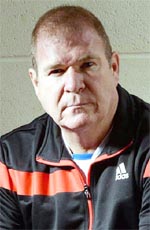Statements
David Sammel

The fact that we are human means that even the best competitors can be rocked by a true statement of intent. If this was a fallacy, there would never be upsets in sports.
There are many athletes arguably less talented than some of their peers yet are able to beat them. Rafael Nadal has a winning record against Roger Federer, who is arguably equal to or better than Nadal in many areas of the game.
It is Nadal's level of intention which caused Federer problems. Nadal plays with a ferocious commitment to win that unsettles most opponents.
Understanding the importance of statements is critical in developing the art of winning the mental game. Making a clear statement of intent delivers a message to your opponent.
The best players in the world understand the value of making an opponent feel uncomfortable. When you send a strong message it also builds your confidence.
Messages can be sent in many ways. Shot making is one. Hitting a a big shot for a winner. Hitting a big serve or an ace on a big point. Counterattacking off your opponent's best shot.
Other ways include, dictating the pace of the match between points and on the changeovers. Showing energy by jogging from your chair.

In a closely fought match momentum will ebb and flow. A very powerful statement is the ability to absorb punishment with a clear mind.
When you are defending an onslaught you must find something to attack. Send the message that you can find a way to hurt your opponent even when you are on the defensive. This may cause him to press and make strategic errors.
Winston Churchill did not win World War Two with his decision to bomb Berlin early in the conflict. But it irritated Adolph Hitler and caused him to shift from bombing airfields to bombing British cities. This changed the game by giving British planes time to get into the air and defend the skies.
Recognizing that a statement has unnerved an opponent is the key to learning how to unlock opponents as people. In these moments you should work hardest to take the match from them or at least to shift momentum back in your favor.
Here is the cycle that leads to success in tough competition:
Make a statement and seize momentum. Drive the advantage. Recognize a good opponent will address this imbalance with his own statements. Absorb any change in momentum. Seize the initiative when the next opportunity arises.
This cycle is the essence of competition. It can occur countless times in a match and sometimes occurs within individual games or even points.
Most players can easily recall the last time they practiced their backhand or their serve. These same players would be quick to admit that the mental game is often what separates levels.

But few can tell you when if ever they practiced it, for example, by visualizing the myriad of competitive situations they will inevitably face, and how to deal with them.
My experience coaching on tour has taught me that it makes a huge difference when a player goes on court knowing the exact statements they will make. Here for example is a statement of intent from Serena Williams: "Hold serve. Focus. Be confident. Move up. Attack. Kill. Smile."





